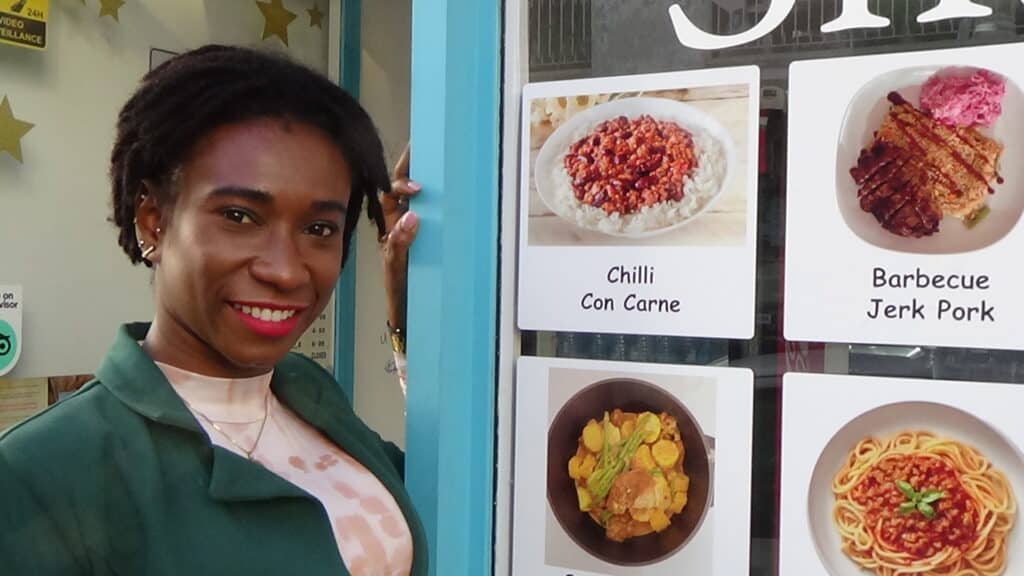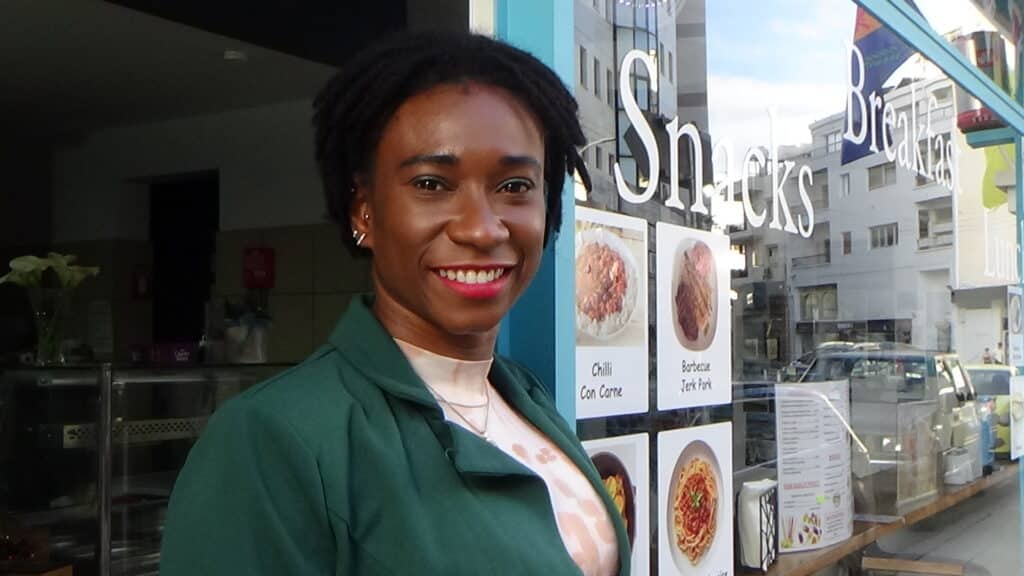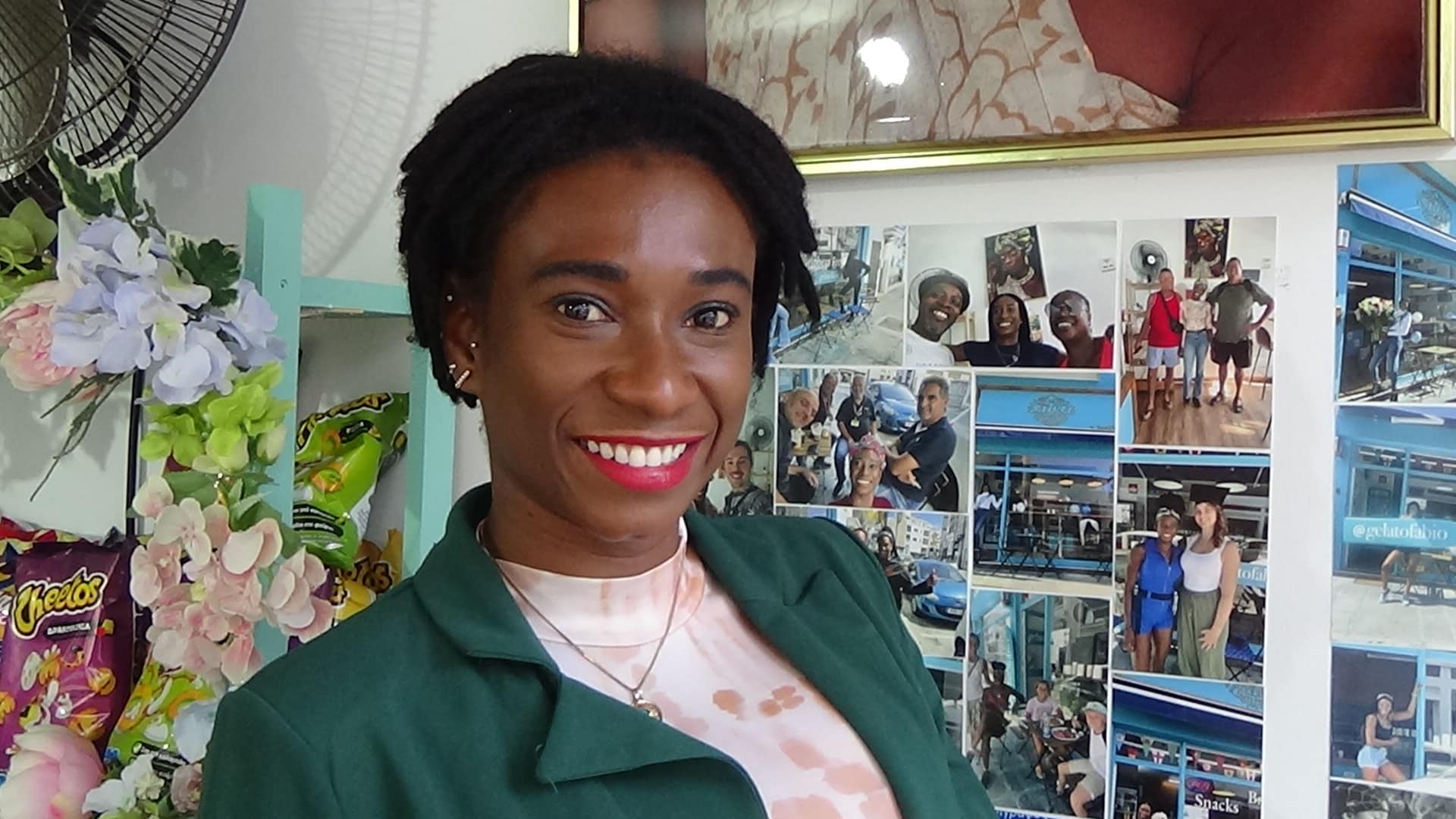A rock-star restaurateur in Larnaca is taking it slow after being given a second chance at life. THEO PANAYIDES finds out what is scary on the outside and beautiful on the inside
The restaurant’s a little bit tucked away in the centre of Larnaca, near Costa Coffee up the road from the police station. You turn into Gladstonos street, and there it is: Katina’s Tasty Food, Caribbean Restaurant. That’s not the whole story, to put it mildly. Then again, I suppose Katina’s Blood-curdling Tales of Being Hit by a Hurricane and Spending 42 Days Adrift on the Atlantic wouldn’t have fit on the sign.
Wait, what? A hurricane? Yes indeed; Katina Baird is lucky to be alive, standing at the counter of the little shop she opened a year ago. What she calls “my big accident” happened in 2013, when she was 21 (she’s just turned 32), after four years of working on yachts around the Caribbean. She grew up in the multicultural, English-speaking South American country of Guyana – her accent is surprisingly British; she was taught by a Scotsman in Grenada, who also taught her how to sail – though life there was pretty quiet. “My adventures started when I was 17, when I left my country.”
Why did she leave? “I left because I didn’t see a future in Guyana,” she explains. She got her first job at 15, in a supermarket, saving up her cash for a couple of years. “Then one day – this is going to shock you, what I’m about to say – one day I’d had enough of life in Guyana. I’d had enough of everything. And I just picked my bags up, got myself a ticket to Trinidad & Tobago, and I’ve never returned since then!”
Is that it? Well, yes and no. We’ll come back to those early, pre-hurricane years – but suffice to say that her description of her childhood doesn’t really square with today’s 32-year-old Katina. The latter, after all, is bubbly and gregarious. One wall of the restaurant is covered in photos of herself with various customers, from a Nigerian saxophonist named Victor to a team of Cyta workers who were laying down cables when they presumably got a craving for barbecue jerk chicken. Another wall is reserved for graffiti: ‘Du styrer for vildt!’ a visiting Dane has told Katina, meaning something like ‘You’re a rock star’ (‘You steer too wild’, is Google’s literal translation). We’re interrupted twice by adoring middle-aged gentlemen, one of whom deposits a bag of fruit on the counter.
“From my orchard,” he says in Greek. “Lemons, oranges, grapefruit…”
“Efcharisto,” smiles Katina. “He’s my neighbour, it’s lovely,” she explains later. “My neighbours are very sweet… I have a family on this block.”

Katina now cooks up a taste of home
Her actual, biological family isn’t quite so straightforward. Katina’s dad is American, though his mother (her grandma) lives in Guyana; that was how he met Katina’s mum, “and then I happened” – though the relationship was brief and mostly long-distance, later replaced, for Katina, by a stepdad and two younger half-siblings. “As a kid, I was very spaced-out,” she recalls. “I did not have a lot of friends and – how can I describe it, I was a weird girl, and a weird teenager. I spent most of the time in the kitchen with my grandma,” incidentally developing the cooking skills she’s now brought to Larnaca.
She was risk-averse, she explains. Guyana was a rough place in those days, “kids would go missing”. Parents issued dire warnings, but most kids ignored them; she herself, however, was “that one kid who wouldn’t do what I was specifically told not to do”. So she was a good kid? “I was a good kid,” she agrees, “but nobody wanted to play with me”. It’s a far cry from today’s rock-star restaurateur – or indeed the adventurous 17-year-old who took off so suddenly, landing a job on her very first day in Trinidad. “I was just wandering along the docks, and this guy came out – tall, Dutch flag on the boat – and he said: ‘I’m gonna need a cook and a clean. Are you available?’.”
Katina worked on boats for four years, initially just cooking and cleaning then later – following an STCW course in servicing outboard engines – as an engineer too. (The skills she picked up aren’t limited to boats; she did most of the painting and woodwork herself when refurbishing the restaurant.) Then, in 2013, she was visiting family in Barbados when “I got a call that somebody needed a captain to help take a yacht to Madeira, and on to the Canary Islands.”
That ‘someone’ was a one-handed Frenchman (he’d lost his right hand in a childhood accident) who was planning to take his yacht, the My 7, back to Europe, after having been in the Caribbean for 15 years. It was an old boat, “scary on the outside, but beautiful on the inside”. A new engine had been fitted for the trip – and so he and Katina set off on a transatlantic crossing that was projected to take about two weeks. It was early September, hurricane season.
Right away, there was trouble: the new engine kept cutting out, due to air in the system. The crew of two soldiered on, using the sails and whatever they could get out of the engine. Then, a week and two days into the voyage, came a radio warning to chill the blood: a hurricane was coming straight for them – and, given the My 7’s limited mobility, it was impossible to manoeuvre out of the way in time. All they could do was sit and wait.
The Frenchman despaired right away. “He said to me, ‘99.9 per cent chance we’re not going to make it’,” she recalls. “The captain! So, if the captain turns around and tells the crew that, you know that we’re done.” Then he locked himself in the cabin and didn’t come out for the rest of the evening, leaving his 21-year-old first mate to try and fight the storm.
Did she cry?
“Yes, of course I cried. And finished the last bottle of French wine!” Katina laughs. “I had, like, three hours of no wind, nothing. Just sitting there in the calm, just waiting.”

Outside the restaurant
She talked to herself. She thanked God – or whoever – for the previous four years, which she’d thoroughly enjoyed: “If I die, at least I die knowing I was happy. I saw a lot of islands and met a lot of beautiful people on my journey”. The sky was clear, the proverbial calm before the storm – then “in just two hours there we go, the scenario starts. The swells get big, the wind started”. The howling wind drowned out all other sounds. All around her was pitch-black (it was night by now) – then, in the morning, so grey and foggy that “you don’t know left from right, there’s nothing”.
The yacht was in the hurricane for 48 hours. “I almost lost my life,” says Katina. “The boat, literally, was going to flip [over] – and I was begging, I was like ‘God, if you’re there show me a sign, because I’m gonna die. This is the end of my life!’.” She was at the wheel, trying to steer a course and prevent them from capsizing. “You don’t know if you’re going to go under, if you’re going to flip, at which point you’re going to flip. Because it’s worse than a baby’s cradle – back and forth. You’re just being tossed around.”
Somehow, they survived – but in fact that’s just half the story. The engine was now completely gone, the sails slashed to bits by the hurricane. The My 7 drifted with the wind, on half-sails, running out of food with each passing day. They tried to fish, but there was no fish in the ocean. (She did catch one, but “it was so beautiful” she threw it back, says Katina, a story so irrational it can only be true.) Migrating birds “were also dropping dead on the deck of the boat,” fatally exhausted by having flown through the hurricane.
Worst of all, she says, no-one rescued them – not because they didn’t see them, but because they didn’t care (or dare). “We had many fishing boats that went past us, and we called for help”, to no avail. “We almost got run over twice by container ships… [even though] we were radioing, trying to tell them that we are a vessel in distress.” It appears that the sea has become such a dangerous place, with so many pirates (who often pretend to need help, to trap Good Samaritans), that no-one trusts anyone anymore – a man-made disaster to add to the natural one.
I’m surprised she didn’t go nuts, I venture.
“I’m a very strong-minded person,” replies Katina. “I have a lot of faith… You may not see a way, but you know – there’s an instinct inside that says ‘There is a way’.” Somewhat unexpectedly, the nights offered some relief, her subconscious trying to make things better with dreams of “fancy restaurants” and “all the beautiful things in the world” – though the nightmares came later, her sleep troubled by terrifying visions of being lost at sea for two years after the ordeal was over.
It ended after 42 days, when Katina and the captain were literally down to their last provisions – a large can of mushrooms. They ate mushrooms for two days, then “on the second day we saw just a little peek of green, and we worked out that was Pico Island in the Azores”. A quick look at a map of the Atlantic shows how lucky they were: had they missed the Azores and kept going east – having already been blown off-course – there’s nothing there till you get to Portugal.
They landed at 3am, walking around trying to find something to eat (rather anti-climactically, everything was closed; the Azores isn’t big on nightlife). They finally saw a café with a laptop and a bottle of wine on the table: “Omigod, somebody is here!”. A British man appeared, shocked by the sight of the bedraggled duo (and “my one-handed captain trying to hide his one hand”), then offered them a can of sardines and some peanuts.
How does it feel to be given a second chance in this way? How has Katina Baird’s outlook changed in the 11 years since that near-fatal crossing? “You become more cautious with life,” she says – a bit surprisingly since I’d have imagined the opposite, that you become more reckless and determined to enjoy every moment. I suppose it depends on your personality.
But there’s something else, too. “I also learned a valuable lesson, in that I don’t hate,” adds Katina. “I learned to not hate. Because if I had died, I would’ve died with a lot of hate on my mind.” Hate for whom? “For my dad – because my dad went away when I was a young kid, and I was kind of abandoned by him… I would say the reason I left Guyana is because I was hurting a lot”.
Maybe that helps to explain those early, pre-hurricane years. Maybe she wasn’t ‘a good kid’ so much as a sensitive one, playing it safe because she felt so abandoned and vulnerable. Maybe the reason why Katina is risk-averse is precisely that early sense of trauma (it’s also the reason, she suspects, why she doesn’t want any children of her own). After all, had she died on that voyage, it would’ve been the first either of her parents even knew about it. At the time, she hadn’t spoken to either one of them for five years.
Even now, despite the bubbliness, there’s a certain wary streak to her personality; she’s not the type who has many friends (just a couple of good ones). Then again, her dad has come to visit her in Cyprus, and she speaks to her mother regularly even if she hasn’t been back to Guyana since 2009 (she hopes to go next year, for her gran’s 80th birthday). Above all, Katina’s doing something she loves, in a place she enjoys. “Cooking is my passion,” she tells me. “I’ve done it since I was a kid, growing up in the kitchen. Cyprus is my home. I decided to live permanently in Cyprus, after the pandemic and after my divorce.”
That, incidentally, was the British man – her accidental saviour in the Azores, of sardines and peanuts fame. They stayed together for eight years, including some idyllic ones in the Azores – living on the beach, in the reassuring shadow of Pico Island – then moved to Europe for health reasons, ending up in Oroklini in 2019 where, unfortunately, the marriage collapsed. Katina decided to stay anyway, cooking up jerk chicken and chili con carne (with milder options for local palates, “because I’m gonna be local myself, pretty much”) while trying to learn Greek and thinking idly of the future. She once did some fashion modelling in the UK – where they lived for two years – but the husband disapproved. Maybe it’s not too late to try again.
It’s never too late – not while there’s life, not while she knows that she’s been “spared” and the world is her oyster. That said, she has no plans to go anywhere. “I’m happy to stay in Cyprus. Cyprus is a very beautiful little island. It’s very relaxed, it’s very calm. A lot of people like to say it’s too slow…” Katina Baird pauses – and I know exactly what she’s thinking, I’m thinking it too. “Yeah, sometimes ‘slow’ is not so bad!” She laughs wryly, the grateful laugh of a woman reborn.







Click here to change your cookie preferences